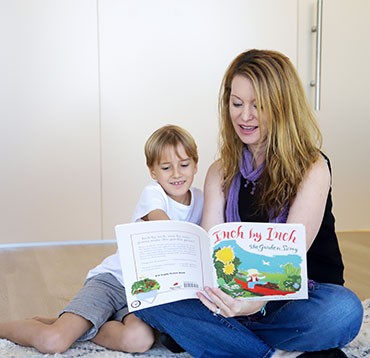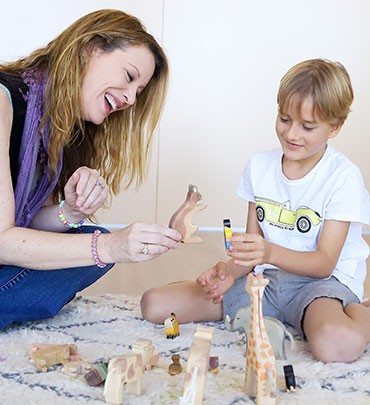Play Therapy
Whole Child Neurodevelopment Group offers play therapy aimed at helping children to interact socially while strengthening cognition, as well as behavioral control and emotional expression.
Play therapy may be effective for young children, usually for those younger than teenagers, and may be especially helpful for children who struggle to articulate or express their emotions or thoughts. In play therapy sessions at Whole Child Neuro, your child will meet with a therapist in a comfortable environment, where playful interaction can reveal the child’s current inner world, while nurturing their growth.
If you’re curious about play therapy and whether or not your child may benefit from this form of therapy, don’t hesitate to reach out to Whole Child Neuro in Encino for further information or to schedule a consultation. You can also continue reading to learn more about play therapy and its many benefits.

What is play therapy?
In each play therapy session, a child is given the opportunity to express themselves in a safe, comfortable, and playful environment.
In this environment, children are encouraged to communicate their feelings, both through non-verbal play, as well as verbally, while playing with toys, props, and other tools that encourage communication.
Through playful interactions, a child may be able to address and overcome stressors and obstacles in his or her life. Play therapy may be a vehicle to help a child to verbalize or express problems they are experiencing.
The therapist may guide the child as they play, or they may let the child play freely, depending on the direction of a given session. Most play therapy sessions are one-on-one, with the therapist observing the child while guiding the session.

The Theory Behind Play Therapy
Play therapy serves as a relaxing, yet amusing time for children, and it encourages cognitive development.
Childhood may be an especially difficult time to communicate and express emotions, feelings, and thoughts. Play therapy in our Encino therapist’s office aims to give children the tools they need to express themselves openly, without inhibition.
Oftentimes, children are restricted in their communicative skills, because they may lack the vocabulary to communicate effectively, they may be shy, or they may have other obstacles that keep them from opening up, such as trauma.
Play therapy utilizes toys, games, and other tools, which help a child to be expressive, imaginative, and creative. In observing a child’s interaction with these tools, we can unveil clues into how a child perceives his or her world, and what occupies their mind.
From there, any underlying issues can be pinpointed and addressed, and children are encouraged to evaluate their inner world as they grow to understand it better. In this way, children may be able to confront and overcome issues in their lives through play therapy. For example, a child may recognize a traumatic event or a poor relationship in their life, and they may begin to overcome the difficulties these issues can cause.
Play Therapy and Development
Childhood is a time of rapid growth and development in the brain. Play is one of the many ways that children develop their minds, and play therapy fosters the development of communication skills and behavioral skills, as well as imagination and creativity.
Children also develop a range of emotions in their youth, and they begin to form lasting memories. Play therapy provides children with an outlet to express their emotions and relive their memories, even without the use of verbal language. In these ways, play therapy actively supports the growth of a child’s mind. In fact, studies have shown that play can stimulate neural growth in the brain.

Who May Benefit From Play Therapy in Encino?
Play therapy may be ideal for children dealing with psychological or social challenges. Play therapy is also helpful for those who are dealing with trauma, or those with behavioral problems. Play therapy can be helpful for children on the autism spectrum, those with AD/HD, those with developmental problems, those with learning difficulties, and those with psychiatric disorders.
Play therapy may be beneficial for all of the following:
- Those with learning disabilities.
- Those with emotional difficulties, including panic disorders, anger, etc.
- Those with behavioral problems, including shyness, aggressiveness, etc.
- Those dealing with grief, loss, or trauma, such as a death in the family or divorce.
- Children with AD/HD.
- Children on the autism spectrum.
- Children who have been abused.
- Children suffering from depression.
- Children dealing with anxiety.

Considering Play Therapy in Encino?
If you think that your child may benefit from play therapy, please don’t hesitate to schedule a consultation. We’ll meet with you and your child to understand their needs. A doctor or teacher often refer children to us. Or, parents may consider play therapy if their child is dealing with trauma, abuse, developmental problems, or emotional, communication, or behavioral issues.
Help Your Child to Reach Their Full Potential With Play Therapy
If you’re interested in play therapy in Encino, we’d be ecstatic to meet with you and your child. We’ll work with you to understand where your child is in their development and how play therapy can help them to grow. From there, we’ll develop a custom play therapy course that’s suited to your child’s unique needs.
At Whole Child Neuro, we proudly provide play therapy for children throughout the Greater Los Angeles area — including residents in Sherman Oaks, Calabasas, and Beverly Hills — from our office here in Encino. Please, don’t hesitate to reach out to us to learn more about our play therapy. At Whole Child Neuro, we help your child to unlock their full potential!
